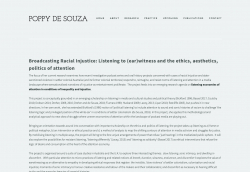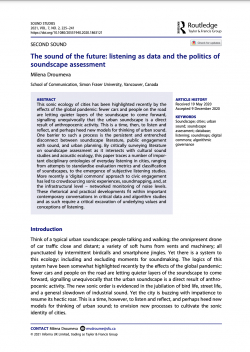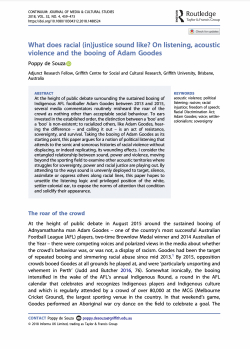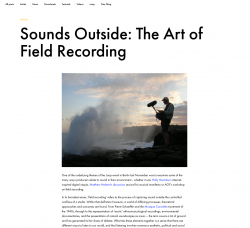Broadcasting Racial Injustice: Listening to (ear)witness and the ethics, aesthetics, politics of attention

Type
Other
Authors
Category
Project
[ Browse Items ]
Publication Year
2021
URL
[ private ]
Abstract
The focus of her current research examines how recent investigative podcast series and oral history projects concerned with cases of racial injustice and state-sanctioned violence in settler colonial Australia (and its former colonial territories) respond to, reimagine, and resist norms of listening and attention in a media landscape where sensationalised narratives of injustice-as-entertainment proliferate. The project feeds into an emerging research agenda on listening economies of attention in conditions of inequality and injustice.
This project is conceptually grounded in an emerging scholarship on listening in media and cultural studies and political theory (Bickford 1996; Bassel 2017; Couldry 2010; Dobson 2014; Dreher, 2009, 2010; Dreher and de Souza, 2018; Fiumara 1990; Husband 2009; Lacey, 2013; Lipari 2010; Ratcliffe 2005), but pushes it in new directions. In her own work, she has extended Bickford’s (1996) notion of ‘political listening’ to include attention to sound and sonic histories of racism to challenge ‘the listening logic and privileged position of the white ear’ in conditions of settler colonialism (de Souza, 2018). In this project, she applies this methodological and analytical approach to new sites of struggle where uneven economies of attention within the landscape of podcast media are playing out.
Bringing an orientation towards sound into conversation with important scholarship on the ethics and politics of listening, the project takes up listening as a) frame or political metaphor, b) an intervention or ethical practice and c) a method of analysis to map the shifting contours of attention in media activism and struggles for justice. By mobilising listening in multiple ways, the project will bring to the fore unjust arrangements of power that refuse ‘just hearings’ in the mediatized public sphere. It will also explore the possibilities for resistant listening, ‘listening differently’ (Lacey, 2013) and ‘listening as solidarity’ (Bassel 2017) as ethical interventions that refuse the logic of desire and consumption at the heart of the attention economy.
The project is organised around a suite of case studies in Australia and the U.K. to explore three intersecting themes: slow listening; sonic intimacy; and dwelling in discomfort. With particular attention to micro-practices of listening and related notions of breath, duration, slowness, endurance, and discomfort it explores the value of earwitnessing as an alternative to empathy in developing ethical responses that register: the invisible, ‘slow violence’ of settler colonialism, colonisation and racial injustice; moments of sonic intimacy to honour creative resistance and labour of the makers and their collaborators; and discomfort as necessary to hearing difficult truths and the everyday legacies of imperial histories.
Case studies include four podcast series and three oral history collections, theorised together as ‘sonic archives’:
Curtain (2016-current, ongoing, 55 episodes to date), first 10 episodes made in association with the Brisbane Indigenous Media Association; now an independently produced and partly crowd-funded production about the wrongful incarceration of Aboriginal man Ken Henry and the death of Aboriginal woman Linda (name withheld for cultural reasons), made by Darambul and South Sea Islander journalist Amy McQuire and Yuin man Martin Hodgson;
The Messenger podcast (2017, 10 episodes, plus 13 unedited audio posts) a collaboration between a not-for- profit organisation Behind the Wire and The Wheeler Centre for Books, Writing and Ideas, and based on thousands of voice messages sent by refugee Abdul Aziz Muhamat detained on Manus Island;
The How are you today? artwork and archive - 14 hours of daily sound recordings made by six men currently detained on Manus Island – Farhad Bandesh, Behrouz Boochani, Samad Abdul, Shamindan Kanapathi, Kazem Kazemi and Abdul Aziz Muhamat - as part of the the Manus Recording Project Collective, and recorded as part of the Eavesdropping exhibition at the Ian Potter Centre in 2018.
Breathless (2018, 6 episodes), a partnership between The Guardian Australia and community media organisation 2SER about the death in custody of Indigenous man David Dungay Jr.
Selected sound recordings from the ‘oral histories of migration, ethnicity and post-colonialism’ collection held at the British Library in London, U.K.;
The Bringing them Home oral history collections held at the National Library of Australia which includes personal testimonies of Aboriginal and Torres Strait Islanders forcibly removed from their families under racist state policies of assimilation.
The project combines archival research (oral history collections); critical media analysis based on a ‘close listening’ (Hoffmann, 2015) of podcasts and oral histories; and qualitative interviews with podcast makers, including with First Nations and asylum seeker/refugee collaborators as ‘theorists of listening’ (Stoever, 2016,17).
The project is framed by a series of motivating questions:
How does each podcast respond to, reimagine and resist the logic of desire and consumption at the heart of the ‘attention economy’ to broadcast racial injustice and mobilise broader social change?
What are the underpinning ethics and models of collaboration behind the production of each series?
What kinds of listening practices do these podcasts insist upon; how are they invitations to listen in differently? How are listeners located, and how/is an ethics of responsibility/response engaged?
How have their conditions of production, collaboration and distribution shaped the ways they have been differently heard and listened to in mainstream public debate?
How do the makers and their collaborators think about listening in both the crafting and making of their work, to enable more sustained, durational forms of listening?; and
How do sounds and soundscapes within each program connect to questions of listening and ethics?
This project is conceptually grounded in an emerging scholarship on listening in media and cultural studies and political theory (Bickford 1996; Bassel 2017; Couldry 2010; Dobson 2014; Dreher, 2009, 2010; Dreher and de Souza, 2018; Fiumara 1990; Husband 2009; Lacey, 2013; Lipari 2010; Ratcliffe 2005), but pushes it in new directions. In her own work, she has extended Bickford’s (1996) notion of ‘political listening’ to include attention to sound and sonic histories of racism to challenge ‘the listening logic and privileged position of the white ear’ in conditions of settler colonialism (de Souza, 2018). In this project, she applies this methodological and analytical approach to new sites of struggle where uneven economies of attention within the landscape of podcast media are playing out.
Bringing an orientation towards sound into conversation with important scholarship on the ethics and politics of listening, the project takes up listening as a) frame or political metaphor, b) an intervention or ethical practice and c) a method of analysis to map the shifting contours of attention in media activism and struggles for justice. By mobilising listening in multiple ways, the project will bring to the fore unjust arrangements of power that refuse ‘just hearings’ in the mediatized public sphere. It will also explore the possibilities for resistant listening, ‘listening differently’ (Lacey, 2013) and ‘listening as solidarity’ (Bassel 2017) as ethical interventions that refuse the logic of desire and consumption at the heart of the attention economy.
The project is organised around a suite of case studies in Australia and the U.K. to explore three intersecting themes: slow listening; sonic intimacy; and dwelling in discomfort. With particular attention to micro-practices of listening and related notions of breath, duration, slowness, endurance, and discomfort it explores the value of earwitnessing as an alternative to empathy in developing ethical responses that register: the invisible, ‘slow violence’ of settler colonialism, colonisation and racial injustice; moments of sonic intimacy to honour creative resistance and labour of the makers and their collaborators; and discomfort as necessary to hearing difficult truths and the everyday legacies of imperial histories.
Case studies include four podcast series and three oral history collections, theorised together as ‘sonic archives’:
Curtain (2016-current, ongoing, 55 episodes to date), first 10 episodes made in association with the Brisbane Indigenous Media Association; now an independently produced and partly crowd-funded production about the wrongful incarceration of Aboriginal man Ken Henry and the death of Aboriginal woman Linda (name withheld for cultural reasons), made by Darambul and South Sea Islander journalist Amy McQuire and Yuin man Martin Hodgson;
The Messenger podcast (2017, 10 episodes, plus 13 unedited audio posts) a collaboration between a not-for- profit organisation Behind the Wire and The Wheeler Centre for Books, Writing and Ideas, and based on thousands of voice messages sent by refugee Abdul Aziz Muhamat detained on Manus Island;
The How are you today? artwork and archive - 14 hours of daily sound recordings made by six men currently detained on Manus Island – Farhad Bandesh, Behrouz Boochani, Samad Abdul, Shamindan Kanapathi, Kazem Kazemi and Abdul Aziz Muhamat - as part of the the Manus Recording Project Collective, and recorded as part of the Eavesdropping exhibition at the Ian Potter Centre in 2018.
Breathless (2018, 6 episodes), a partnership between The Guardian Australia and community media organisation 2SER about the death in custody of Indigenous man David Dungay Jr.
Selected sound recordings from the ‘oral histories of migration, ethnicity and post-colonialism’ collection held at the British Library in London, U.K.;
The Bringing them Home oral history collections held at the National Library of Australia which includes personal testimonies of Aboriginal and Torres Strait Islanders forcibly removed from their families under racist state policies of assimilation.
The project combines archival research (oral history collections); critical media analysis based on a ‘close listening’ (Hoffmann, 2015) of podcasts and oral histories; and qualitative interviews with podcast makers, including with First Nations and asylum seeker/refugee collaborators as ‘theorists of listening’ (Stoever, 2016,17).
The project is framed by a series of motivating questions:
How does each podcast respond to, reimagine and resist the logic of desire and consumption at the heart of the ‘attention economy’ to broadcast racial injustice and mobilise broader social change?
What are the underpinning ethics and models of collaboration behind the production of each series?
What kinds of listening practices do these podcasts insist upon; how are they invitations to listen in differently? How are listeners located, and how/is an ethics of responsibility/response engaged?
How have their conditions of production, collaboration and distribution shaped the ways they have been differently heard and listened to in mainstream public debate?
How do the makers and their collaborators think about listening in both the crafting and making of their work, to enable more sustained, durational forms of listening?; and
How do sounds and soundscapes within each program connect to questions of listening and ethics?
Description
http://www.poppydesouza.com/listening-economies-of-attention
Number of Copies
1
| Library | Accession No | Call No | Copy No | Edition | Location | Availability |
|---|---|---|---|---|---|---|
| Main | 621 | 1 | Yes |



